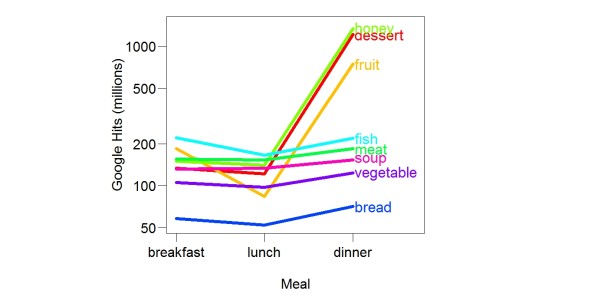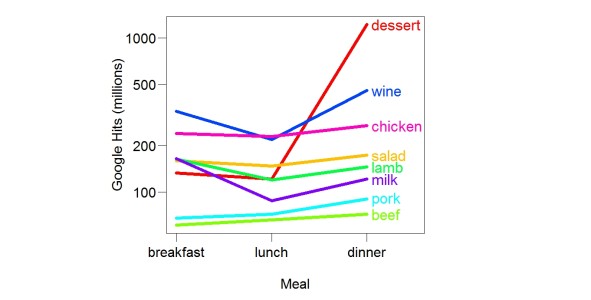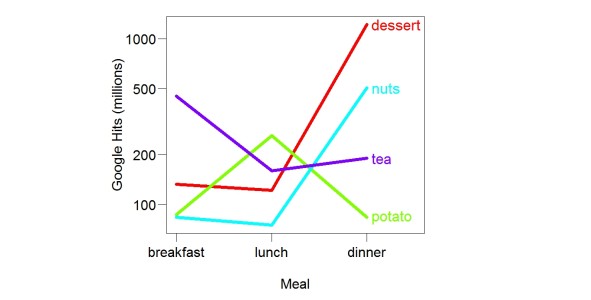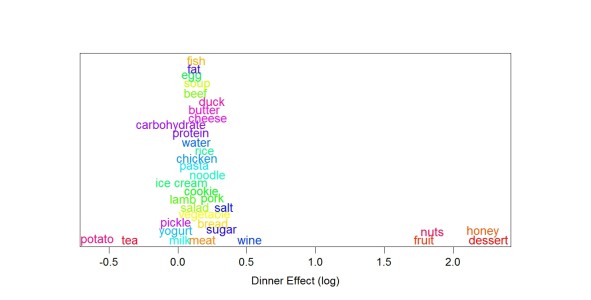I have blogged many times that bedtime honey improves sleep. I learned this from Stuart King, an Australian musician. He also pointed out we eat dessert with dinner more than with other meals. which others who have described the honey effect have not said. The dessert observation suggests that other sweets, not just honey, improve sleep. After I repeated the dessert observation, a friend said I of all people should know it isn’t universal. The Chinese don’t eat dessert, she said. Yes, I said, but where I lived in Beijing there seemed to be lots of sweets eaten in the evening, and lots of street vendors selling fruit in the evening.
The honey-sleep connection helped me improve my sleep in other ways. I found my sleep got better if in addition to bedtime honey I ate fruit (e.g., banana) an hour or so before bedtime. My sleep got even better if I ate something sweet, such as Yakult, an hour or so before that. Both observations implied that honey improved sleep because of the sugar. Nowadays I usually eat three sets of sweets: soon after dinner, mid-evening, and bedtime. I sleep very well every single night, better than ever before. These findings make sense if glycogen (stored glucose) is very important for sleep. My way of eating (three sets of sweets slightly spread out) may produce more glycogen at bedtime than similar ways of eating (e.g., eating the same sweets spread throughout the day).
Recently I realized that Stuart’s observation about dinner and dessert made a prediction: the word dessert should be better associated with the word dinner than the words breakfast and lunch. (A lot of talking/writing consists of describing reality.) I used Google to test this prediction. I counted the hits returned when I searched “dessert dinner”, “dessert breakfast”, and “dessert lunch”. The prediction turned out to be true: “dessert dinner” had a lot more hits than the other two combinations, even though breakfast, lunch and dinner are almost equally common.
I checked about forty other food words: Were they more associated with one meal than others? I found several interesting things.
1. It wasn’t just dessert. Honey and fruit were associated with dinner more than breakfast or lunch. The size of the association was very similar in the three cases. For almost all other food words I tested there was little or no association.

Here are examples of little or no association.

2. There were some surprising associations, shown here.

No surprise that tea is associated with breakfast but why is potato associated with lunch? French fries? Why is nuts associated with dinner? Do nuts contain something that improves sleep?
For each food I computed a “dinner effect” meaning the log(dinner count) minus the average of log(breakfast count) and log(lunch count). Here is a kind of histogram of those values.

The outlier status of nuts, fruit, honey and dessert is clear.
These findings support (a) the original idea (because the original idea led to them), (b) the importance of the original idea (because the association is so clear) and (c) use of Google to learn what people do. Word associations are influenced by many things, no doubt; these results suggest actual behavior is a strong influence. Use of Google to study behavior is free, public, fast, and convenient.
I was surprised the results were so clear. I suspect the explanation is that sweets taste better closer to bedtime. Dessert, honey and fruit differ in many ways; the similarity of size of association suggests that the association is due to what they share (sugar).
I hereby give you permission to eat dessert with dinner.
“Dinner usually refers to the most significant meal of the day, which can be the noon or the evening meal.
However, the term “dinner” can have many different meanings depending on the culture; it may mean a meal of any size eaten at any time of day.[1][2]
Historically, it referred to the first meal of the day, eaten around noon, and is still occasionally used for a noontime meal if it is a large or main meal.
However, the meaning as the evening meal, generally the largest of the day, is becoming standard in the English-speaking world.”
https://en.wikipedia.org/wiki/Dinner
from memory, my mum called me in for dinner for the early evening meal, whereas my mates mum called him in for Tea (he had has ‘dinner’ at lunch time).
that’s Tea as meal (not as a drink),
https://en.wikipedia.org/wiki/Tea_(meal)
https://www.dailymail.co.uk/health/article-2582867/Saturated-fat-DOESNT-cause-heart-disease-all.html
>
> (dɪˈzɜːt)
>
> Also 7–8 desert, 8 des-, disart, 9 desert.
>
> [a. F. dessert (Estienne 1539) ‘removal of the dishes, dessert’, f. desservir to remove what has been served, to clear (the table), f. des-, L. dis- + servir to serve.]
>
> 1. a.1.a A course of fruit, sweetmeats, etc. served after a dinner or supper; ‘the last course at an entertainment’ (J.).
>
> 1600 W. Vaughan Direct. Health (1633) ii. ix. 54 Such eating, which the French call desert, is unnaturall. 1666 Pepys Diary 12 July, The dessert coming, with roses upon it, the Duchesse bid him try. 1708 W. King Cookery 261 ‘Tis the dessert that graces all the feast. 1739 R. Bull tr. Dedekindus’ Grobianus 96 If the Guests may pocket the Desart. 1834 Lytton Pompeii iv. iii, The dessert or last course was already on the table. 1846 J. Baxter Libr. Pract. Agric. (ed. 4) II. 69 The Medlar‥when in a state of incipient decay is employed for the dessert. 1875 Jowett Plato (ed. 2) III. 696 Pleasant kinds of dessert, with which we amuse ourselves after dinner.